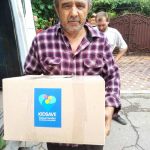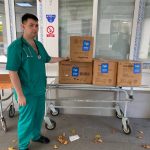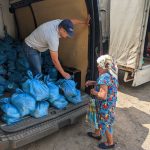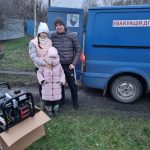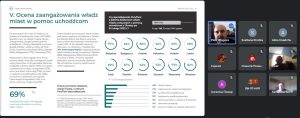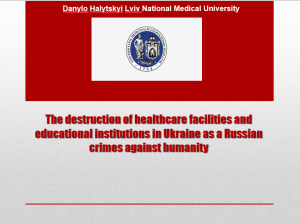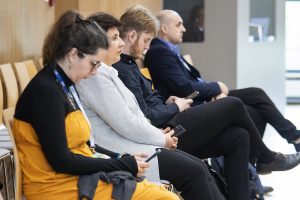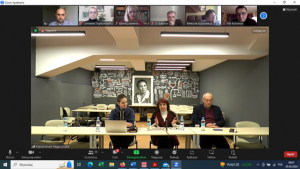Kidsave’s Angels of Hope: Protecting and Evacuating Ukraine’s Most Vulnerable Children
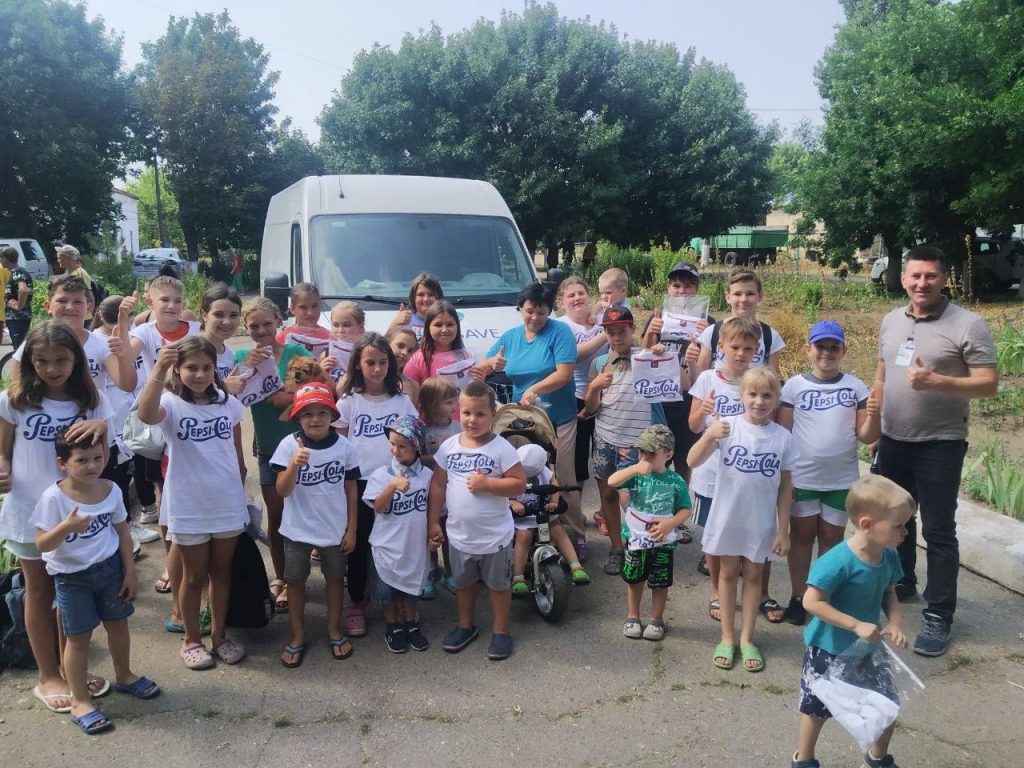
Kidsave: Who We Are
Kidsave is a U.S.-based 501(c)(3) nonprofit organization dedicated to championing older kids in orphanages and foster care. We shine a light on kids who have been forgotten or deemed “unadoptable” because of their age and create opportunities for them to be seen, find family, and thrive.
Kidsave was founded in 1999 by friends and business partners Terry Baugh and Randi Thompson. The idea for Kidsave came after Baugh first visited an orphanage in Russia and saw the deplorable conditions in which the children were living. Baugh and Thompson—both adoptive parents—realized that the child welfare system was failing in the U.S. and in countries around the world. Children—specifically older kids and teens—were being forgotten and left to grow up in the system before aging out into adulthood without the love and support of a family.
Thompson and Baugh started Kidsave and designed the Family-Visit Model, a unique and innovative program that allows caring adults to meet and interact with children before committing to adoption. The kids and families meet and spend time together through events hosted by Kidsave, and then both the kids and the adults are able to choose who they would like to spend more time with in the future. This model is based on the simple premise that relationships are more likely to flourish when they can develop naturally over time in a safe, low-pressure environment, and create a more secure familial bond. The Family Visit Model has been highly successful, and over the last 23 years, Kidsave has been using it to create support systems and forever families for thousands of children around the world.
History of Kidsave in Ukraine
Kidsave began working in Ukraine in 2016 when the government of Ukraine began making reformations to the child welfare system, including a push for deinstitutionalization. Deinstitutionalization reform (DI) refers to the process of moving children out of large and crowded institutions or orphanages and into a family care setting. In 2016, there were approximately 106,000 orphans living in these overcrowded, long-term institutions. The National Strategy for Reforming the System of Institutional Care and Upbringing of Children Act began work within the country to remove children from these large institutions and place them in a family-care setting, such as with extended family or kin, a foster parent or guardian, or an adoptive family (Ukraine Cabinet of Ministers, 2017).
Kidsave supported this effort and began working to support change. We established a relationship with partner organizations One Hope (Kyiv), Sunrise of Dreams (Mykolaiv), My Home (Kherson), ILDC, and Alliance Ukraine Without Orphans. We also signed a Memorandum of Understanding with the Office of the Ombudsman for Children under the President of Ukraine. In 2018 we established and co-founded the Ukraine National Mentoring Association for Children and Youth.
Kidsave’s work in Ukraine set out to accomplish two goals:
- To move children out of institutional care and into a family-care setting
- To provide mentoring and workforce readiness to older kids exiting or soon to exit institutional care
These two goals were addressed through two programs: Kidsave’s Family Mentoring program and Kidsave’s Corporate Mentoring Program Pathway to Success.
Kidsave’s Corporate Mentoring Program
An ongoing concern is that many of the teens who age out of institutional care in Eastern Europe do not have the skills or experiences necessary to successfully embark on an independent life. Research suggests that children reared in institutions are often stunted physically, mentally, and emotionally, preventing them from developing adequate life skills (Dobrova-Krol, 2008). Because of this, youth raised in institutions often do not have the skills or knowledge needed to pursue vocational education, find a good job, or work to their full potential. Kidsave’s Corporate Mentoring Program is a mentoring and social adaptation program that addresses these issues by empowering young people to build healthy, productive, and independent lives by connecting them to caring adult mentors who will help them to succeed.
Kidsave’s Corporate Mentoring program was created for:
- 14- to 18-year-olds who are exiting or soon to exit institutional care,
- 19- to 23-year-olds living independently or in group
Because these young people were forced to grow up in institutional care without the direct support of a family, many enter adulthood without a sense of direction or purpose in their life. The goal of Kidsave’s Corporate Mentoring Program is to help them plan for their futures in ways they may have never considered possible before. We help them understand their career interests, boost their confidence to manage in the workforce and society, increase their motivation and readiness to work, and support their basic understanding of money management. At its core, Kidsave works to help these children navigate their futures and care for them in ways that they were unable to receive in their early lives.
The program provides all the tools and resources needed to enable organizations to recruit, screen, and train adult mentors. The trained mentors then provide the youth with personal connectedness, supervision, guidance, financial and legal literacy, life skills development, vocational training, internship and career opportunities, a sense of self-worth, goals, and hope for a successful future. In addition to knowing they are making a tremendous difference in the life of a young person, businesses and organizations who participate in the Corporate Mentoring program also benefit from this relationship as it is an opportunity for them to boost their image and reputation, develop and improve their own skills, strengthen their local communities, empower their employees to be leaders, and develop and attract new talent to their company.
Over the life of our Pathway to Success Program, we have assisted a total of 830 youth in their transition from institutional care to independent living. In 2021, we had 50 participants – 24 females and 26 males – in our Pathway to Success program. Of these 50, 43 were new referrals.
The Results of Kidsave’s Pathway to Success program in 2021 were:
- 16% of participants were newly employed,
- 20% of participants began an internship,
- 12% of participants completed an IT certification program,
- 16% of participants applied to receive higher education to pursue their chosen field,
- All participants received job training and
Despite current challenges, the Pathway to Success program continues today, as discussed later in this paper.
Kidsave’s Family Mentoring Program
With the passing of the National Strategy for Reforming the System of Institutional Care and Upbringing of Children Act, Ukraine has made promising steps towards deinstitutionalization (Ukraine Cabinet of Ministers, 2017). However, Ukraine currently lacks the infrastructure necessary to safely and effectively move children out of institutions and into families. There are an insufficient number of social workers within Ukraine and an inadequate number of support services available to guide the reintegration of children back into their communities. Additionally, the existing support services are not sufficiently adapted for children with disabilities (Ismayilova, 2014; Semigina, 2014). Because of these insufficiencies, nongovernmental organizations – like Kidsave – have played a large role in deinstitutionalization and reintegration efforts.
To safely and effectively place Ukrainian children with Ukrainian families, Kidsave developed its Family Mentoring Program. This program was developed as an adaptation to Kidsave’s programs operating in the U.S. and was launched as a pilot program in 2018 in Mykolaiv and Kherson. Like Kidsave’s U.S. programs, the Family Mentoring Program utilizes the
Family Visit Model.
What is Kidsave’s family-visit model?
Kidsave’s unique family-visit model is based on the proven idea that people who have been introduced to a child and have had the chance to get to know them are much more likely to open their homes and hearts to them. With this idea in mind, Kidsave has developed a system that allows people who may be interested in adoption – whether that is extended family/kin, someone from the community, or someone entirely new – to meet the child in a safe, neutral environment and start to get to know them.
Kidsave’s family-visit model consists of the following key elements and processes:
- Diligent Search, outreach, and family
- Preparation and training
- Events
- Hosting and Mentoring
- Child Specific advocacy
- Support
- Tracking
- Reintegration and Post Placement
This model has been successful everywhere it has been properly implemented, and the pilot program in Mykolaiv and Kherson proved to be no exception. Between January 2018 and December 2021, Kidsave held recruiting events, performed community outreach, conducted family-finding and reunification efforts, and provided support and advocacy. As a result of this work, 144 children were removed from institutional care and placed in a family care setting in Mykolaiv and Kherson. Because of this enormous success, Kidsave was in the process of expanding the program to six additional regions in Ukraine when the Russian invasion began.
Angels of Hope: Kidsave’s Work During the War
Like millions of others, our world changed on February 24, 2022. Upon hearing the news of the invasion, Kidsave Co-Founder and CEO Randi Thompson immediately reached out to our team in Ukraine. At the time, there were only two Kidsave staff members in Ukraine, but there were hundreds of children who had – at one time or another – been involved in Kidsave programs. We felt a deep and sincere obligation to those children and to the families created through our programs. We could not leave them to fend for themselves.
Rescue and Evacuation
In concordance with the Decree of the President of Ukraine No. 68/2022, Pavlo Shulha, Expert in the Office of the President of Ukraine on Children’s Rights and Department of children and family services in the Mykolaiv Region, and the Kidsave team began evacuating orphanages within the path of the hostilities (Library of Congress, Office of the President of Ukraine). To ensure the safety and well-being of the children, it was determined that orphans and children deprived of parental care would be evacuated with their caregivers and taken to established safe houses in western Ukraine. Keeping the children together and with their primary caregivers provided the children with a sense of comfort and normalcy throughout the evacuation process and mitigated the risks of the children being separated or trafficked. In total, our team successfully evacuated ten orphanages in the Mykolaiv region to safety. The children that our team evacuated continue to live in safe houses in the Carpathian Mountains where they are under the supervision of Children’s Rights officials and orphanage caregivers with ongoing support from Kidsave staff and volunteers. While evacuating the orphans to safety was our first priority, we knew we couldn’t stop there. Our team of dedicated volunteers quickly grew from 10 to over 100, and additional financial support from donors in the U.S. allowed us to purchase buses and vans to evacuate larger groups of people. While we continued to prioritize families with children, we worked to evacuate as many people as possible to safety.
Our team developed a system to carry civilians in impacted regions to safety either in western Ukraine, or to the borders of the neighboring European countries of Moldova, Romania or Poland. To complete these evacuation routes, our teams were traveling upwards close to 1,200 km in one direction. It became imperative that we established a safe place for those evacuating and our volunteer drivers to rest before completing the long journey. Our team connected with a church in Vinnytsia which graciously opened its doors to us and allowed us to use their building as a welcome center. The church had recently built a large expansion onto the auditorium, which our team filled with cots, blankets, and pillows. In addition to providing a safe place to rest, volunteers also utilize the church’s kitchen to prepare hot meals for those traveling. During the first few months of war, between 300-400 people used the welcome center a day before continuing their journey to safety.
Within the first month of evacuations, our team had safely transported over 4,000 people out of active combat zones. Our team became known to the locals as Anhely Nadiyi – the Angels of Hope – and it is not a name that we take lightly. As of December 6, Kidsave’s Angels of Hope have rescued over 30,000 people.
In addition to conducting evacuations, providing for the orphans in western Ukraine, and maintaining the welcome center in Vinnytsia, our team of volunteers has also developed a system for sourcing and delivering humanitarian aid to those sheltering in place in Ukraine. The Angels of Hope team now consists of close to 300 volunteers throughout the country and a network of volunteers in Poland and other European countries.
Humanitarian Aid
According to the United Nations International Children’s Emergency Fund (UNICEF) there are “more than 5.5 million children in need of humanitarian assistance” as a result of
Russia’s war on Ukraine (UNICEF, 2022). In addition to the casualties and destruction, Russia’s war in Ukraine has already created a wave of food instability as Ukraine’s means of food production have been disrupted (Kottasová, 2022). Our team in Ukraine became painfully aware of the food shortage and immediately began working to source food and supplies in neighboring countries, such as Poland, Germany, and the Netherlands.
Our staff and volunteers began developing a system of sourcing food and aid from these neighboring countries, carrying it across the Ukrainian border, and distributing it to those in heavily affected areas such as the Donetsk, Luhansk, Kherson, Mykolaiv, Kharkiv, Zaporizhzhia, Chernihiv, Odesa, and Kyiv oblasts. Appendix 1 provides a more detailed list of all of the areas where our team has delivered humanitarian aid.
We, of course, could not accomplish this feat alone. We developed partnerships early on with other nongovernmental organizations such as World Food Programme, Samaritan’s Purse, and We Stand With Ukraine. These vital partners were able to help bear the weight of sourcing food and aid, and our team of versatile volunteers were able to dedicate their efforts primarily towards delivering the aid. Over the last ten months, our team has helped to deliver nearly 1,000 tons of humanitarian aid across Ukraine.
Mentoring Through War
Although much of Kidsave’s efforts have been focused on rescue and evacuation and providing humanitarian aid during this conflict, we have continued to operate our Pathway to Success program and provide mentoring and support to 50 teenagers in the Kyiv region. Through this program, these 50 young people are able to connect with caring adults and mentors in their community and maintain some element of normalcy through organized events, service days, and volunteering.
While these events and activities often look different during this war, nevertheless they continue to provide the teens with valuable mentorship and job training. Our team has also been connecting the youth with resources such as trauma therapy and programs for young people affected by conflict and war.
Looking to the Future
As we continue to work to meet the needs of the children of Ukraine during this time of conflict, we are also looking at how we can help rebuild and restore the nation once peace is reestablished. To do this, Kidsave is in the process of constructing a Kidsave Miracles Center in western Ukraine. This center will serve as a safe house for orphans in need of evacuation through the duration of this conflict. Then, once it is no longer needed as a safe house, it will become a place where child welfare professionals can receive training on war-trauma therapy and our proven programs, including our Corporate Mentoring program and family-visit model. It will also serve as a place where orphaned children can connect with potential adoptive families and where teens can receive mentorship, acquire internships and job training.
While today may feel bleak for the children of Ukraine, we are hopeful for a better tomorrow, and we will continue to do everything we can to secure their future. From the time of our founding in 1999, Kidsave has been unwaveringly dedicated to the well-being of the
world’s most vulnerable children, those who – through no fault of their own – have been forced to grow up without the love and support of a family. Our work in Ukraine is no exception, and we will continue to put the needs, safety, and well-being of orphans and children first in everything we do.
Appendix 1-Full list of Areas of Humanitarian Aid Distribution:
Mykolaiv, Yuzhnoukrains’k, Pidlisne, Voznesens’k, Matviyivka, Balabanivka, Nova Odesa, Ternivka, Voznesens’k, Mala Korenykha, Velyka Korenakha, Lymany, Lupareve, Zelenyi Hai, Chernihiv, Shestovytsia, Kyinka, Ivanivka, Pakul, Mykhailo-Kotsyubyns’ke, Horodnya, Kyiv, Berezna, Mnev, Dniprovs’ke, Sloboda, Zhavynka, Ripky, Malynivka, Teryahivka, Bashtanka, Shevchenkove, Snihurivka, Novooleksandrivka, Mishkovo-Pohorilove, Kalynivka, Voskresens’ke, Zaichivske, Buz’ke, Dil’nyche, Sykhyi Elanets, Malynivka, Kherson, Odesa.
By Chloe Fuller, Noopur Desai, Tatiana Stafford, and Nata Kravchuk Kidsave International.
